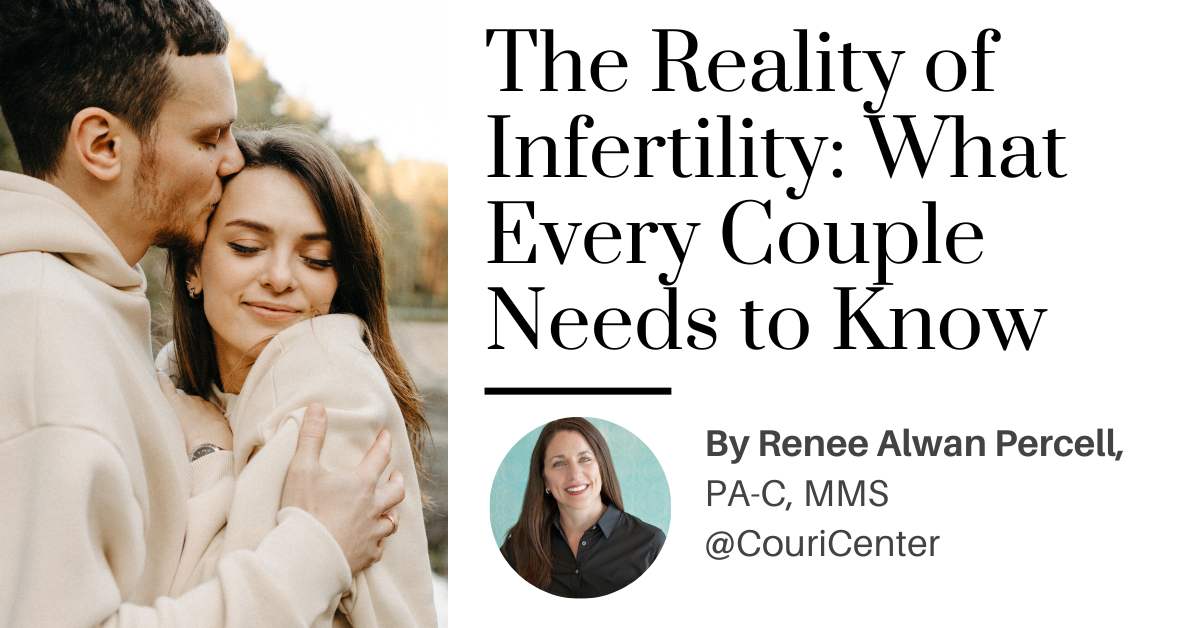
Summary
In her latest blog, Renee Alwan Percell, MMS, PA-C, shares a compassionate and informative look at the rising prevalence of infertility, now affecting 1 in 6 people globally. Learn what factors—such as age, BMI, lifestyle habits, and even male fertility—may impact your ability to conceive. With infertility rates increasing, especially as more couples delay pregnancy, Renee highlights the importance of early conversations with your healthcare provider. The Couri Center offers integrative, preconception support to help optimize your fertility and overall health before pregnancy.
Thinking about starting a family? Schedule a consult today at the Couri Center in Peoria, IL.
Growing Together Through Life’s Milestones
One thing that I love about my job is that I get to grow with my patients. Over the years, I have cared for many teens who are now in their 20s and thinking of starting a family. This season of life is so exciting, and it is a joy to guide young women along. Sometimes, things do not go as planned, however. Many women do not get pregnant right away. This can lead to much anxiety and despair. Talking with your healthcare provider when childbearing is on the horizon can help to facilitate success.
Understanding the Causes of Infertility
There are many reasons why a woman may not get pregnant right away. In fact, the prevalence of infertility has become more pronounced in recent years, with both men and women facing challenges. According to the World Health Organization, 1 in 6 people globally are affected by infertility, highlighting a significant public health concern WHO, 2023. About one-third of infertility cases are related to female factors, one-third are related to male factors, and one-third are a combination of both. Some female factors include ovulation dysfunction, fallopian tube disease, endometriosis, and age. It’s worth noting that male factors, such as low sperm count, poor sperm motility, and hormonal imbalances, are equally crucial to consider. Studies have shown that male infertility contributes to nearly 50% of all infertility cases, underscoring the importance of evaluating both partners during fertility assessments American Society for Reproductive Medicine, 2021. Infertility is a disease defined by the failure to conceive after 1 year of unprotected intercourse in women younger than 35 or after 6 months for women over the age of 35.
Current Trends in Infertility
An average of 1 out of 6 people are affected by infertility. Age is the most significant predictor of success in achieving a pregnancy. After age 32, there is a decline in fertility, and then there is a further decline after age 37. Interestingly, the trends of infertility have shifted with changing societal norms and lifestyles. Today, more couples are choosing to start families later in life, which can contribute to higher rates of infertility due to age-related factors. Additionally, environmental toxins and increased stress levels are emerging as contributors to reproductive health challenges, further emphasizing the complexity of infertility in modern society U.S. Department of Health & Human Services, 2023. The National Institute of Child Health and Human Development has linked lifestyle factors such as obesity, strenuous physical labor, substance abuse, alcohol abuse, and diseases such as high blood pressure that contribute to increasing rates of infertility. A woman’s age has the most significant effect on her fertility closely followed by an increased BMI >30.
The Role of a Healthy Lifestyle in Fertility
Maintaining a healthy lifestyle is key to living a long, healthy life and your fertility. Healthy living includes not smoking, avoiding excessive alcohol, eating a balanced diet, and exercising. At the Couri Center, we have several opportunities to improve lifestyle habits with realistic guidance. If having a baby is on the horizon, now is the time to evaluate your health and establish good habits. Incorporating integrative practices, such as stress management techniques, regular exercise, and nutritional counseling, can be pivotal in enhancing fertility and overall reproductive health The Doctor’s Farmacy Podcast, 2023. While the Couri Center does not do obstetrics, we are here for you before and after pregnancy and are happy to help you along this journey!
Be Well,
Renee Alwan Percell MMS PA-C
DISCLAIMER: THE INFORMATION PROVIDED ON THIS WEBSITE IS INTENDED FOR GENERAL INFORMATIONAL PURPOSES ONLY AND IS NOT INTENDED TO BE A SUBSTITUTE FOR PROFESSIONAL MEDICAL ADVICE, DIAGNOSIS, OR TREATMENT. THE INFORMATION PROVIDED IS CURRENT AS OF THE DATE OF PUBLICATION OR LAST REVIEW, BUT MEDICAL KNOWLEDGE IS CONSTANTLY EVOLVING, AND THE INFORMATION MAY BECOME OUTDATED OVER TIME.
References:
World Health Organization: Infertility Statistics
American Society for Reproductive Medicine: Reproductive Facts
U.S. Department of Health & Human Services: Women’s Health
The Doctor’s Farmacy with Dr. Mark Hyman – Infertility Insights
https://www.womenshealth.gov/a-z-topics/infertility
https://www.who.int/news/item/04-04-2023-1-in-6-people-globally-affected-by-infertility
https://www.reproductivefacts.org
